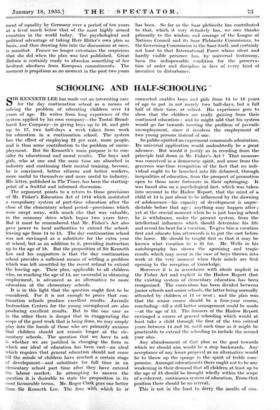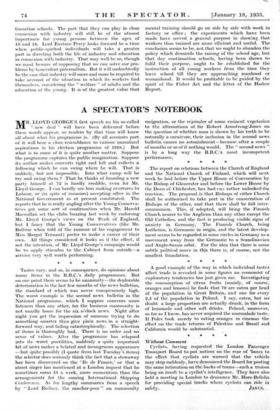SCHOOLING AND HALF-SCHOOLING
SIR KENNETH LEE has made out an interesting case for the day continuation- school as a means of solving the problem of educating children over- 14 years of age. He writes from long experience of the system applied by his own company—the Tootal Broad- hurst Lee Company—in giving -boys up to 18, and girls up to 17, two half-days a week taken from work for education in a continuation school. The system has the effect of employing 25 per cent. more people, and is thus some contribution to the problem of unem- ployment. But Sir Kenneth's main purpose is to con- sider its educational and moral results. The boys and girls, who at one and the same time are absorbed in industry and continuing their mental training, become, he is convinced, better citizens and better workers, more useful to themselves and more useful to industry. His letter, published in The Times, has been the starting- point of a fruitful and informed discussion.
The argument points to a return to those provisions of Mr. Fisher's Education Act of 1918 which instituted a compulsory system of part-time education after the close of the elementary school period—provisions which were swept away, with much else that was valuable, in the economy drive which began two years later. But it must be remembered that Mr. Fisher's Act also gave power to local authorities to extend the school- leaving age from 14 to 15. The day continuation school was not envisaged as a substitute for the extra year at school, but as an addition to it, providing instruction up to the age of 18. But the proposition of Sir Kenneth Lee and his supporters is that the day continuation school provides a sufficient means of settling a problem which was left unsettled, by the recent refusal to extend the leaving age. Their plan, applicable to all children who, on reaching the age of 14, are successful in obtaining employment, is advanced as an alternative to more education at the elementary schools.
It is in this light that the question ought first to be considered. For it is not enough to• proVe that con- tinuation schools produce excellent results. Juvenile Instruction Centres for the young unemployed are also producing excellent results. But in the one case as in the other there is danger that in. exaggerating the scope of the good work that is being done, we may simply play into the hands of those who are primarily anxious that children should not remain longer , at the ele- mentary schools. The question that we have to ask is whether we are justified in changing the form in which our ideal of education has been cast—an ideal which requires that general education should not cease till the minds of children have reached a certain stage of development—and substitute for full time in an elementary school part time after they have entered the labour market. In attempting to answer the question it is desirable to 'state the proposition in its most favourable terms. Mr. Roger Clark goes one better than.- Sir Kenneth'. Lee. The firm with which he is' connected enables boys and girls from 14 to 16 years of age to put in not merely two half-days, but a full half of their time, at school. His experience goes to show that the children are really gaining from their continued education ; and he might add that his system would go far towards meeting the problem of juvenile unemployment, since it involves the employment of two young persons instead of one.
So public-spirited an experiment commands admiration. Its universal application would undoubtedly be a great advance. But would it justify us in receding from the principle laid down in Mr. Fisher's Act ? That measure was conceived in a democratic spirit, and arose from the generous war-time recognition of the fact that no indi- vidual ought to be launched into life debarred, through inequalities of education, from the prospect of promotion open to those more fortunate in their upbringing. It was based also on a psychological fact, which was taken into account in the Hadow Report, that the mind of a child at 14 is just about to be influenced by the dawning of adolescence—his capacity of development is unpre- dictable before that age ; anything may happen after ; yet at the crucial moment when he is just leaving school he is withdrawn, under the present system, from the intellectual influences which should determine his life and reveal his bent for a vocation. To give him a vocation first and educate him afterwards is to put the cart before the horse. He should be taught first so that it may be known what vocation he is fit for. Mr. Wells in his autobiography has shown the agonizing and tragic results which may occur in the case of boys thrown into work at the very moment when their minds are first opening to the reception of knowledge.
Moreover it is in accordance with ideals implicit in the Fisher Act and explicit in the Hadow Report that the existing system of elementary education has been reorganized. The curriculum has been divided between junior schools and senior schools, the latter being normally attended by children of 11 or over ; and the plan was that the senior course should be a four-year course, concluding—till a still better arrangement could be made —at the age of 15. The framers of the Hadow Report envisaged a course of general schooling which would at least take a child through the first of the two critical years between 14 and 16, until. such time as it might be practicable to extend the schooling to include the second year also.
Any abandonment of that plan as the goal towards which we should aim would be a step backwards. Any acceptance of any lesser proposal as an alternative would be to throw up the sponge in the spirit of feeble com- promise. Amongst educationists there ought not to be any weakening in their demand that all children at least up to the age-of 15 should be brought wholly within the scope of a coherent, continuous system of education. From that position there should be no retreat: . This is not in the .least to decry the merits of con-- tinuation schools. The part that they can play in close connexion with industry will still be of the utmost importance for young persons between the ages of 15 and 18. Lord Eustace Percy looks forward to a time when public-spirited individuals will take a greater part in directing both the life of industry and education in connexion with industry. That may well be so, though we must beware of supposing that we can solve our pro- blems by benevolent paternalism. But it will undoubtedly be the case that industry will more and more be required to take account of the situation in -which its workers find themselves, considering the " welfare " of adults and the education of the young. It is of the greatest value that mental training should go on side by side with work in factory or office ; the experiments which have been made have served a general purpose in showing that workers thus trained are more efficient and useful. The conclusion seems to be, not that we ought to abandon the policy which demands the raising of the school age, but that day, continuation schools, having been shown to fulfil their purpose, ought to be established for the instruction of all young workers from the time they leave school till they are approaching manhood or . womanhood. It would be profitable to be guided by the spirit of the Fisher Act and the letter of the -Hadow Report.







































 Previous page
Previous page